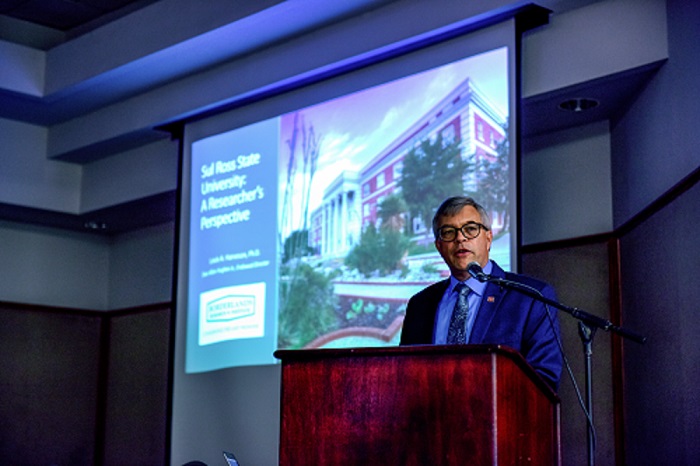
by Travis Hendryx, Office of Public Relations
Growing up in the mountains of Central Idaho was just what Dr. Rob Kinucan needed to spark his love for teaching students about the great outdoors.
Kinucan, who began his new role as Executive Vice President and Provost on July 1, also served as Associate Provost for Graduate Studies and Research at Sul Ross after a teaching career that spanned more than 30 years.
Even before enrolling as a freshman at the University of Idaho, Kinucan said becoming a teacher was a career path he was destined to pursue.
“In many respects, teaching was my first career choice,” said Kinucan. “It was my love for botany and wildlife that led me to study Rangeland Ecology and Range Resources.”
As an undergraduate, Kinucan worked four years under the college work study program which availed him to graduate students pursuing studies in forestry, wildlife and range sciences.
It also provided a foot in the door for Kinucan to continue on to graduate school at the University of Wyoming before pursuing his doctorate at Texas A&M University.
“We conducted a lot of prescribed burning when I was at the University of Idaho,” Kinucan said. “So I had the opportunity to assist those graduate students with their projects by collecting data in implementing those prescribed burns.”
While an undergrad, Kinucan also served as a seasonal forestry technician and firefighter.
“That’s where my interest to continue on to grad school started,” he said.
While pursuing his Master’s Degree at the University of Wyoming, Kinucan was involved in several areas of classroom teaching including serving as a grad assistant in the laboratory.
“Teaching labs was a great experience because there were so many of them,” Kinucan said. “But I also had the opportunity to fill in as a lecturer for faculty members when they were gone.”
“Those experiences really stimulated my interest in teaching in higher education.”
From Wyoming, Kinucan moved on to College Station to complete his PhD.
In 1984 he received his first academic appointment as an instructor in the Department of Rangeland Ecology and Management at Texas A&M.
“A&M offered a very robust and dynamic program in Rangeland Ecology and is one of the top accredited programs in the country,” Kinucan said.
Originally, Kinucan’s plan was to earn his doctorate in Texas before heading back home to Idaho but a tight job market at the time led him to West Texas to join the Sul Ross faculty in the Division of Range Animal Science.
“There were a lot of qualified people on the market back then,” he said. “But very few open positions.
“Sul Ross came around at just the right time because I was working as a visiting assistant professor at A&M but that was a fulltime, term position that expired in August of 1988.”
Kinucan remained as a classroom instructor until the end of the Spring, 2019 semester.
He reflected on how student learning has changed throughout his years as an educator and touched on the advancement of knowledge application.
“I think public education has changed quite a bit in terms of how students process their learning,” Kinucan said. “Technology and the internet have a lot to do with that because of the instant access to information.”
He added that today’s students are very astute on fact checking and locating digital forms of information.
“But I don’t think they are as versed in learning methods that my generation was accustomed to,” said Kinucan, noting the use of hard copy through books and journals.
“So they approach education from a little bit different perspective which takes some adjustment on some of the older faculty like myself.”
“Those newer learning methods and styles aren’t good or bad, just different,” he said.
Kinucan reiterated that one of the challenges facing teachers in higher education today is modifying teaching methods to facilitate generational learning types.
“Finding creative ways to accommodate those different learning approaches will be a task that all our faculty members will face,” Kinucan said.
“Again, these approaches are not bad but they are different and they are evolving all the time.”
“So our challenge as educators is to keep pace and be responsive to those needs,” he said.
On the topic of making adjustments, Kinucan said his transition from an educator to an administrator has been a step-by-step process.
“At Sul Ross, it’s been a gradual change,” said Kinucan. “Our department chairs teach three-quarter time and our deans at a quarter time.”
“We’ve had a lot of academic administrators that continue to teach. I was able to teach while I was serving as Associate Provost so, again, the process here is a little more measured than at a lot of other institutions,” he said.
As an administrator, Kinucan says there is greater opportunity to work with faculty and other administration in implementing and refining academic policies.
“As Associate Provost, I’ve been able to work with sponsor programs and external funding,” Kinucan said.
“Those avenues can have a huge impact on the effectiveness of faculty and opportunities for students so being an administrator really opens some doors in terms of having a positive influence on the university’s mission.”
While embracing his new position as Executive Vice President and Provost, Kinucan will always value his years spent in the classroom.
“Through time, I really enjoyed the experiences of being a classroom teacher because I could see the things I did to facilitate student learning that would impact their lives,” said Kinucan.
And in the long run, witnessing what his students become is the greatest reward.
“To have former students visit and validate their educational experience in terms of how their education helped them become successful and productive citizens is extremely gratifying,” he said.
